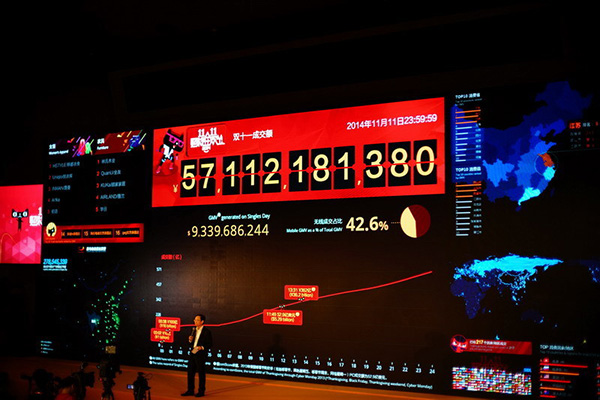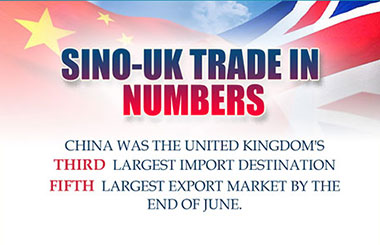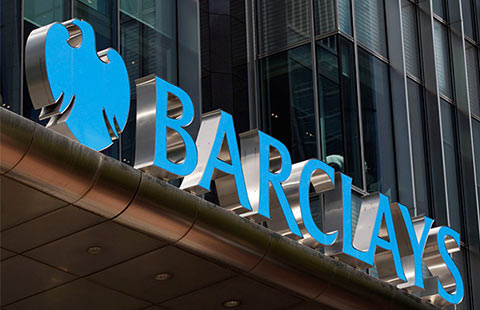Alibaba to offer Nov 11 deals in offline stores
By MENG JING (China Daily) Updated: 2015-10-23 11:04
|
 |
|
The big screen shows sales volume during the Nov 11 Singles' Day shopping spree at Alibaba's headquarters in Hangzhou city, East China's Zhejiang province, on Nov 11 2014. [Photo/Provided to chinadaily.com.cn] |
Alibaba Group Holding Ltd used to fly solo on Singles' Day, China's largest online shopping festival that falls on Nov 11 every year.
But this year, the online shopping giant plans to make the 24-hour festival an "omni-channel celebration" by inviting a large number of bricks-and-mortar stores across the country to participate too.
Alibaba said that 180,000 offline stores, such as shopping malls and chain stores, across 330 cities in China will be involved in the Nov 11 event.
Zhang Jianfeng, president of Alibaba's retail business unit, said the first-time participation of so many thousands of offline stores-including Alibaba's new partners Suning Commerce Group Co Ltd and Intime Retail (Group) Co Ltd-will create a shopping extravaganza combining the digital economy with bricks-and-mortar.
"Alibaba has been successful at building its business online. But we've been thinking for a while about how to work with offline partners as they are still such an influential power in the economy," said Zhang.
The offline stores will integrate with Alibaba's membership and product management, logistics and delivery service systems.
Customers buying home appliances online, for instance, will have their items delivered in as quickly as two hours from the nearest retail store participating in the Nov 11 event.
They will also be able to try on clothes at nearby shopping malls, and buy items via smartphone at Nov 11 sale prices, online, via Alibaba's Tmall platform.
The developments are the latest moves in the rapid expansion of mobile shopping in China.
Nearly 43 percent of Alibaba's 57.1 billion yuan ($8.98 billion) of sales during last year's Nov 11 were made via mobile devices, and this year the company projects the number will top 50 percent.
This year's teaming-up by Alibaba with offline stores-its traditional rivals-however, comes as no great surprise to industry observers.
Wang Xiaoxing, from Beijing-based Internet consultancy Analysys International, said Alibaba has already shown a strong willingness to grow its presence offline after buying 20 percent of Suning in August.
The companies are integrating their online and store-based shopping businesses.
During next month's Nov 11, anyone buying electronic products on Tmall will be offered free after-sales services at 1,600 Suning stores, which clearly benefits both companies.
"With the slowing of the Chinese economy and the sluggish progress of traditional retailers, it is important for e-commerce companies and offline operators to work together," he said.
Hu Yanping, an analyst with DCCI Data Center of China Internet, said this budding relationship is likely to pose a major threat to the Beijing-based JD.com Inc, which specializes in selling branded electronics.
Sun Weimin, Suning's vice-chairman, insisted on Monday that products that will be sold during this year's Nov 11 will not be beaten on price by those sold on JD.com.
- Guangdong reports increase in service platforms for entrepreneurs
- China's property market continues to pick up
- Italian entrepreneurs eye collaboration with China on infrastructures
- Chinese company launches JV with Namibia cement company
- Chinese businesses hope to benefit from Lancang-Mekong River Mechanism
- China's largest private oil firm launches O2O service
- Belt and Road helps China become net capital exporter: Report
- Bank of China becomes LCH.Clearnet's first Chinese PPS Bank














